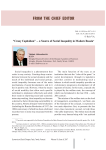Статьи журнала - Economic and Social Changes: Facts, Trends, Forecast
Все статьи: 1553
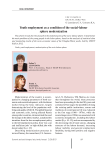
Youth employment as a condition of the social-labour sphere modernization
Статья научная
The article reveals the role of youth in the modernization of the socio-labour sphere. It determines the main problems of the young people in the labor sphere, based on the analysis of statistical data and monitoring results of the socio-economic status of the Vologda Oblast youth, held by ISEDT RAS in 2012.
Бесплатно
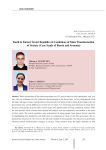
Статья научная
Value orientations of the older generation (over 55 years of age) are well-established, and, as a rule, they are influenced by the worldview that developed in the Soviet time. As for young people, their life ideas relating to various manifestations of social reality are still actively forming. In this regard, the two generations have certain differences in their sets of values. It is interesting and important to study them because young people perceive their current status and opportunities as being completely natural, while for their parents much of what looks normal and routine now was completely inaccessible in the years of their youth. The article considers value orientations of young people from former Soviet countries by highlighting their similarities and differences in comparison to those of the older generation. We are particularly interested in the views on the life and mindset of young people who represent a generation oriented toward modernization changes in society...
Бесплатно
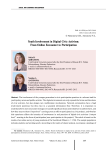
Youth involvement in digital civic activism: from online encounter to participation
Статья научная
The involvement of the younger generation in civic participation practices is a relevant task for youth policy actors and public activists. The digital environment not only expands the forms and directions of civic activism, but also designs new mobilization mechanisms. Network communities have a high involvement potential, but they exist in a saturated information flow. Therefore, it is important to understand how users encounter messages on socially significant issues and initiatives to address them, and how they react to them (“input level”: coming across an offer to participate in a civic project); and whether this experience affects the intensity of involvement in real practices of digital civic activism (“output level”: reacting in the form of participation/non-participation in the project). The article is based on the results of an online survey of young residents of the Sverdlovsk Oblast (n = 1150). The sample population includes students and working youth. According to the results of cluster analysis, we propose a typology of models showing how young people encounter the content about civic initiatives; we identify and describe three types: involved, superficial and scrolling readers. We provide a classification of resources that young citizens are subscribed to, in terms of their connection with issues of civic activism; we also reveal that subscriptions to specialized resources are closely connected with the typology of encountering this type of content. We reveal how young people react when they come across civic messages, and find out that they mostly show denying and interested reactions, while the amount of supportive and active responses is negligible. We build a typology of digital participation based on assessing the intensity of involvement. The share of those highly involved in the information field and real practices is 5%; the majority of respondents belong to the medium-active and low-active participants in civic activism.
Бесплатно
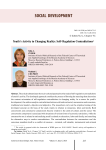
Youth's activity in changing reality: self-regulation contradictions
Статья научная
The article substantiates the socio-cultural approach to the study of self-regulation contradictions of youth's activity. The developed approach considers the process of forming the meanings that determine the content orientation of self-regulation contradictions in changing reality. As a source for youth's development, the authors analyze contradictions between cultural and social, unconscious and conscious, traditional and modern, objective and subjective. The researchers carry out the empirical testing of the developed concept on the basis of the study results in relation to education, labor and family. Both conservative and constructive components become evident in the clash of culture and the social. The conservative component is associated with situations of various forms of economic restrictions, while the constructive one is related to rationalizing youth's attitude to education, labor and family, and searching for alternative ways to resolve contradictions. The contradiction between the unconscious and the conscious manifests itself as a conflict of essences - terminal, self-valuable, instrumental and rational attitude to the objects of reality. The contradiction between the traditional and the modern appears in different ways in education, labor, and family. In education, traditional educational values are devalued; there are no conditions for strengthening the modern ones. In labor, the historically formed contradiction of its instrumental and terminal essence persists. In family relations, there is a sharp discrepancy between the youth's desire for modern forms of family creation and the traditional forms that dominate in the society. The contradiction between the objective and the subjective in various spheres reflects the existing problems of objective reality and the subjective youth's attitude toward them. Empirically, the authors analyze the contradictions based on the results of comparative sociological studies conducted in 2014 and 2017.
Бесплатно
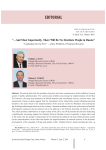
Статья научная
The article deals with the problem of poverty and other consequences of the inefficient current system of public administration. The current state of affairs concerning the implementation of the May 2012 decrees, the long-term dynamics of official statistics and sociological surveys, concrete facts, and assessments of many experts suggest that the orientation of the ruling elites toward obtaining personal benefits is the main threat to the implementation of the tasks set out by the President (overcoming the lag; finding breakthrough solutions to the country's internal problems) and to the achievement of specific development indicators that he pointed out in the Address to the Federal Assembly on March 1, 2018. The article provides information on major results of the 2012 and 2018 presidential elections indicating a significantly increasing support for Vladimir Putin in Russian society (especially in large cities) and at the same time the people's rising hopes for his showing the political will and making decisive action on the nationalization of the elites that hinder the implementation of national interests in the dynamic development of the standard of living and quality of life...
Бесплатно
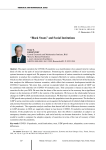
“Black swans” and social institutions
Статья научная
The paper considers the COVID-19 pandemic as a manifestation of an upward trend in various kinds of risks on the path of social development. Promoting the adaptive abilities of socio-economic systems becomes an urgent task. We propose to use the experience of various countries in combating the pandemic to analyze the conditions that help to respond effectively to various unforeseen challenges, which are often referred to as “black swans” in modern literature. We present a brief review of the literature that analyzes the differences between countries, which affect their economic development amidst the COVID-19 pandemic. We prove that, contrary to popular belief, the continued growth of GDP can be combined with relatively low COVID-19 mortality rates. This conclusion is based on data from 30 countries for the year 2020. We note that the share of the service sector in the economy has a significant impact on the dynamics of GDP in the context of the pandemic. We focus on the relationship between changes in GDP in 2020 and institutional circumstances. We find that it is possible to curb the decline in GDP growth rates primarily in those countries where the population trusts the government. The decline in GDP in some countries under consideration occurs against the background of relatively high information and personal freedom that contributes to a decline in the level of trust in the government in the context of the pandemic. The regression analysis confirms that almost half of the differences between countries in GDP dynamics in 2020 are negatively related to two factors: COVID-19 mortality and information freedom. If the people have no trust in the government, then the efforts it undertakes to adapt to an emergency situation may prove ineffective, and social activity can become destructive. In the future, it would be useful to compare the adaptive capacity of countries in terms of the rate of recovery of their economies after the pandemic.
Бесплатно
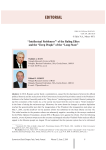
“Intellectual feebleness” of the ruling elites and the “deep people” of the “long state”
Статья научная
In 2018, Russian society faced a contradiction, caused by the discrepancy between the official political rhetoric and the real actions of the Government. Instead of the priorities stated in the President's Address to the Federal Assembly and in the “May decree” (reducing poverty twofold, Russia's joining the top five economies of the world, etc.), the society was faced with the need to take a “bitter medicine” in the form of raising the retirement age. Moreover, the news about the changes in pension legislation reached the general public just after the inauguration of the President (the inauguration took place on May 7, 2018, and the draft law on the pension reform was submitted to the State Duma on June 16). The initial reaction to the pension reform was adamantly negative: according to the surveys conducted by the Public Opinion Foundation, almost 80% of Russians were against the reform. Over the following months, a wave of protests swept across the country and stopped only after Vladimir Putin made an official appeal to the Russian people on August 29 and explained that the pension system has to be reformed; he proposed some adjustments that would soften some conditions of the reform for certain population groups. However, despite the fact that the visible signs of public discontent (protests, critical articles, etc.) are gradually fading, the level of people's support for the authorities, including the President of the Russian Federation, continued to decline; fundamental changes began to take place in the public consciousness, and such changes are of a long-term nature. This fact proves that the pension reform only triggered a more profound internal discontent that has been accumulating over the last years. Thus, at the beginning of 2019, the fundamental question concerning the legitimacy of power in Russia became one of the most pressing and urgent for society and authorities with regard to actual implementation of the tasks set out in the “May Decree”, qualitative growth of the standard of living and, by and large, preservation of the Russian statehood. A deep and ideologically saturated article of V. Putin's personal adviser V. Surkov, which was published in February 2019, addresses this very issue (as some experts think), and it has caused a wide resonance in the academic, political and social environment. The following materials present our views on Surkov's article and on a significant set of issues raised in it. The conclusions we come to are supported not only by the results of our own studies of the long-term dynamics of public opinion, but also by expert assessments, which largely reflect the real situation in the country.
Бесплатно
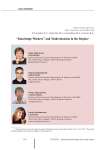
“Knowledge workers” and modernization in the region
Статья научная
Professional education is the main part of personnel training and it serves as the driver of modernization process. “Knowledge workers” are carriers of knowledge provided by the professional training system. Professional activity of “knowledge workers” is strategically important in the economy under transformation. The paper reviews domestic and foreign experience and defines criteria for identifying people as “knowledge workers”: educational level, employment in “intellectually demanding” industries. The study identifies specific characteristics of “knowledge workers”, represents their typological classification depending on their employment affiliation (professional managers, new workers, certified technicians, scientists, innovator specialists). The paper focuses on determining the level of implementation of employment potential of qualified specialists in the context of economic modernization. The authors define the dependence of the level of regions' modernization on the employment of workers that have vocational education...
Бесплатно

“Live and learn”: conceptual discourse on people's financial literacy
Статья научная
In modern social reality, well-being of individuals, including their financial well-being, is increasingly becoming a zone of personal responsibility. At the same time, in the Russian context, the majority of people remain almost entirely dependent on wages as the only source of income. This fact, along with a low level of financial literacy, is an actual risk for individuals and the financial system of the country. Consequently, the importance of adequate financial knowledge, skills and actions within the financial education and training system is increasing. This brings to the fore the task of revealing “weak spots” in financial literacy and identifying vulnerable population groups so as to develop effective management decisions; this can be done with the help of well-elaborated tools used to study financial literacy. The goal of our paper is to carry out critical analysis of available theoretical and methodological approaches to the study of people's financial literacy...
Бесплатно
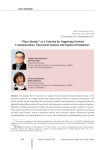
Статья научная
The purpose for the research is to analyze the key features of local identities based on the theoretical approach of multiple identity and analysis of large volumes of empirical information. The article is based on the hypothesis that the spread of global communications as widespread practices gradually brings citizens outside the local circle, providing socio-economic and socio-cultural integration. Methods of analysis: calculation of indices of strata proximity, regression models, analysis of variance. The research novelty lies in the substantiation of the necessity of introducing the contextual meaning of the term “place identity” which is associated with the socio-economic criteria of support for network communications by content features and is due to the mechanisms for distinguishing levels of strata proximity. The authors empirically verify the concept on sociological databases; identify new effects and performance of identities in Russia. The main results include: theoretical study and empirical estimation of the regional identity based on comparative analysis of performance of seven regions and Russia as a whole by a common methodology during 2002-2016; the author's model of structuring “place identity” as a symbolic resource and a criteria of support for network communications; the differences of strata proximity levels and main factors for their reproduction...
Бесплатно
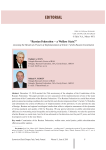
Статья научная
December 12, 2018 marked the 25th anniversary of the adoption of the Constitution of the Russian Federation. The paper provides our own assessment of the implementation of one of the main provisions of the Constitution of the Russian Federation: “The Russian Federation is a social State whose policy is aimed at creating conditions for a worthy life and a free development of man” (Article 7). We define and substantiate the criteria of efficiency of implementation of this provision; we also provide the data of foreign, Russian and regional sociological studies that reflect a subjective assessment of the dynamics of living standards and quality of life by Russians. We pay special attention to public administration efficiency in overcoming social inequality and achieving social justice. Ultimately, we raise the questions whether Russia is a social state, how far it has advanced in this direction over the past 25 years, and what its prospects can be in the near future.
Бесплатно
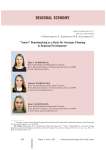
“Smart” benchmarking as a basis for strategic planning in regional development
Статья научная
Addressing the problem of scientific substantiation of the region’s development priorities is an urgent issue for both regional researchers and territorial managers. At the same time, when determining the areas of development, the emphasis is often put on successful experience of the leading territories. This method of transplantation of best practices in order to improve the performance of the object under analysis is called benchmarking. In classical understanding, the key stages of regional benchmarking are: selection of the leading region for comparison, identifying the differences between the leading region and the region under analysis, analysis of key success factors of the leading region, and implementing successful experience in the economic practice of the research area. At the same time, the absence of preliminary analysis of reasons and prerequisites for achieving leadership by best regions, comparison of territories with objectively different characteristics of socio-economic development, leads to non-compliance with the most important principle of regional development planning - the principle of goal-setting...
Бесплатно

